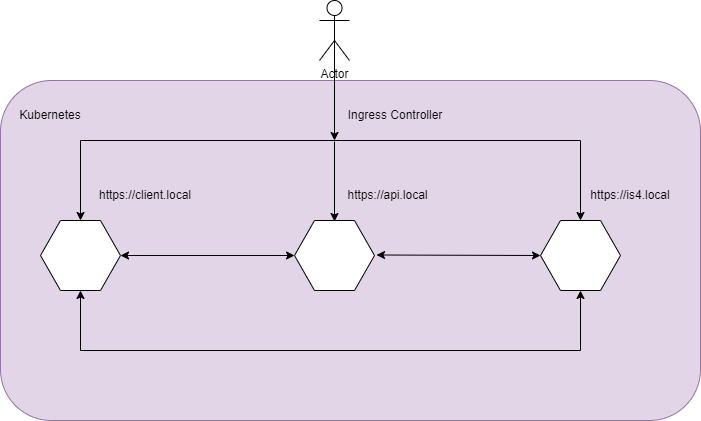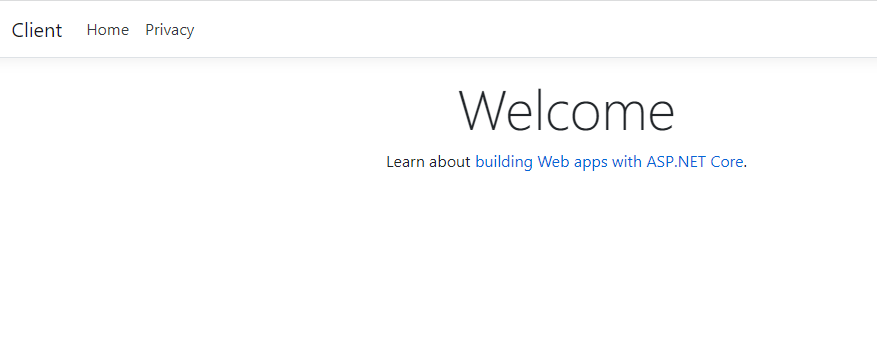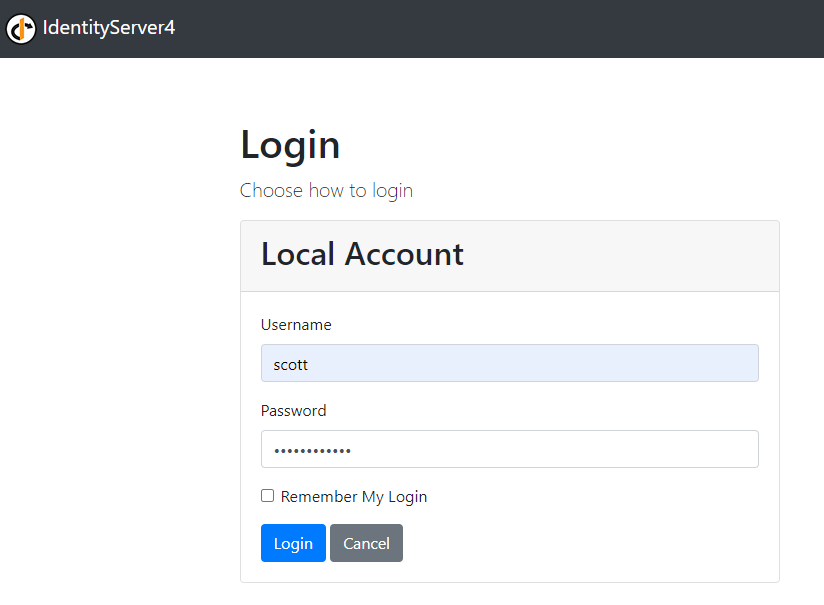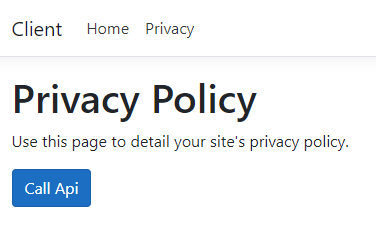Identity Server - Kubernetes
10 Feb 2022- Identity Server - Example
- Identity Server - EF to PostgreSQL
- Identity Server - Dockerization (1)
- Identity Server - Dockerization (2)
- Identity Server - Kubernetes
This example is for local (dev) environment ONLY, not for production environment
In Kubernetes branch (based on Docker branch), there are 3 main changes:
- Ingress Controller will be responsible for routing the requests to the corresponding containers
- Service endpoint will become
[x].default.svc.cluster.locale.g. identity-core-api-service.default.svc.cluster.local - In-Memory Resources, Clients and Users will be used in Identity Server
Similar to dockerization, it is critical to figure out each individual DNS from all the Kubernetes Service, then generate self-signed certificate. Otherwise System.Security.Authentication.AuthenticationException: The remote certificate is invalid according to the validation procedure will be thrown.
- Install Docker Desktop
- Enable Kubernetes in Docker Desktop Settings
- Instal NGINX Ingress Controll
kubectl apply -f https://raw.githubusercontent.com/kubernetes/ingress-nginx/controller-v1.1.1/deploy/static/provider/cloud/deploy.yamlA few pods should start in the ingress-nginx namespace:
kubectl get pods --namespace=ingress-nginx - Generate self-signed certificate
- Add configuration file e.g. “is4-container-cert.conf” to ./Certificates folder
[req] distinguished_name = req_distinguished_name req_extensions = req_ext x509_extensions = v3_ca [req_distinguished_name] commonName = jaylin commonName_default = localhost commonName_max = 64 [req_ext] subjectAltName = @alt_names 1.3.6.1.4.1.311.84.1.1=ASN1:UTF8String:Something [v3_ca] subjectAltName = @alt_names basicConstraints = critical, CA:false keyUsage = keyCertSign, cRLSign, digitalSignature,keyEncipherment [alt_names] # Local domains DNS.1 = api.local DNS.2 = client.local DNS.3 = is4.local # Kubernetes DNS.4 = *.default.svc.cluster.local # docker-compose DNS.5 = localhost DNS.6 = 127.0.0.1 DNS.7 = is4 DNS.8 = api - Open bash command and navigate to Certificates folder
- Run openssl command to generate Linux certificate
openssl req -x509 -nodes -days 365 -newkey rsa:2048 -keyout ./is4-container-cert.key -out ./is4-container-cert.crt -config ./is4-container-cert.conf - Run openssl command to generate Windows certificate
openssl pkcs12 -export -out ./is4-container-cert.pfx -inkey ./is4-container-cert.key -in ./is4-container-cert.crt
- Add configuration file e.g. “is4-container-cert.conf” to ./Certificates folder
- Create TLS secret named
k8s-tls-secretin Kuberneteskubectl create secret tls k8s-tls-secret --key is4-container-cert.key --cert is4-container-cert.crtTo re-create the secret, it needs deleting first, then create again:
kubectl delete secret k8s-tls-secret - Update Dockerfile to copy the pfx to app folder in container
FROM base AS final ...... WORKDIR /app COPY --from=publish /app/publish . COPY ["./Certificates/is4-container-cert.pfx", "./is4-container-cert.pfx"] ENTRYPOINT ["dotnet", "API.dll"] - Add api yml file
apiVersion: apps/v1 kind: Deployment metadata: name: identity-core-api labels: app: identity-core-api spec: replicas: 1 selector: matchLabels: app: identity-core-api template: metadata: labels: app: identity-core-api spec: containers: - name: identity-core-api image: api:latest imagePullPolicy: IfNotPresent env: - name: ASPNETCORE_ENVIRONMENT value: Development - name: ASPNETCORE_URLS value: https://+:443 - name: IdentityServer__Audience value: api1 - name: IdentityServer__Authority value: https://identity-core-is4-service.default.svc.cluster.local - name: ASPNETCORE_Kestrel__Certificates__Default__Password value: P@ssword! - name: ASPNETCORE_Kestrel__Certificates__Default__Path value: ./is4-container-cert.pfx --- apiVersion: v1 kind: Service metadata: name: identity-core-api-service spec: type: ClusterIP ports: - port: 443 targetPort: 443 protocol: TCP name: https selector: app: identity-core-apiEnvironment variables will be almost the same as docker-compose.override.yml, Kestrel Path comes from Dockerfile at #6
- Apply to Kubernetes
kubectl apply -f api.yml - Continue #6, #7 and #8 for Client and IdentityProvider project
- Add Ingress Controller to route traffic
 In below yml file, a few things need highlighting:
In below yml file, a few things need highlighting:
- rules.host must exist in tls.hosts array
- tls.hosts.secretName comes from #5
- annotations.backend-protocol is used to enforce container protocal e.g. HTTPS
- annotations.proxy-buffer-size and annotations.proxy-buffer-number are used to resolve 502 Bad Gateway issue from NGINX when redirecting to /signin-oidc from Identity Server
apiVersion: networking.k8s.io/v1 kind: Ingress metadata: name: identity-core-api-ingress labels: app: identity-core-api-ingress annotations: kubernetes.io/ingress.class: nginx nginx.ingress.kubernetes.io/backend-protocol: "HTTPS" nginx.ingress.kubernetes.io/proxy-buffer-size: "128k" nginx.ingress.kubernetes.io/proxy-buffers-number: "4" nginx.ingress.kubernetes.io/use-regex: "true" nginx.ingress.kubernetes.io/rewrite-target: /$1 spec: tls: - hosts: - api.local - client.local - is4.local secretName: k8s-tls-secret rules: - host: api.local http: paths: - path: /(.*) pathType: Prefix backend: service: name: identity-core-api-service port: number: 443 - host: client.local http: paths: - path: /(.*) pathType: Prefix backend: service: name: identity-core-client-service port: number: 443 - host: is4.local http: paths: - path: /(.*) pathType: Prefix backend: service: name: identity-core-is4-service port: number: 443 - Apply to Kubernetes
kubectl apply -f ingress.yml - Add 3 domains in hosts
- api.local 127.0.0.1
- client.local 127.0.0.1
- is4.local 127.0.0.1
- Browse https://client.local

- Navigate to Privacy, it will redirect to Identity Server to login (username / password: scott / Password123!)

- After login successfully, it will redirect back to Privacy page

- Click on Call Api button
- API access authorized! should return



